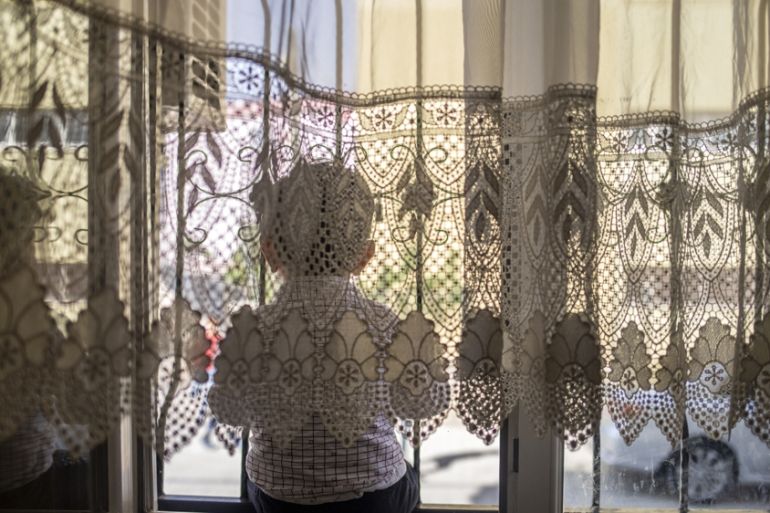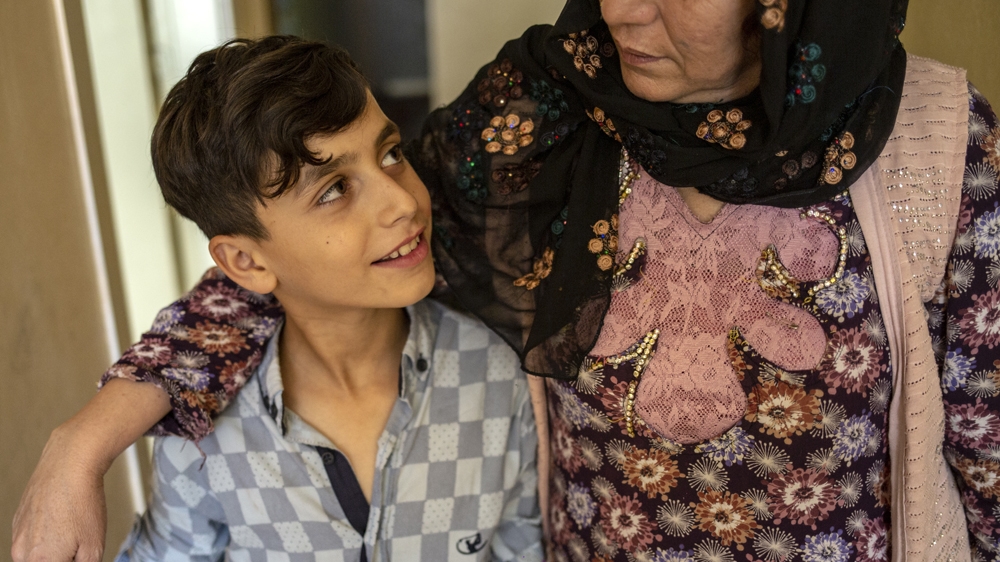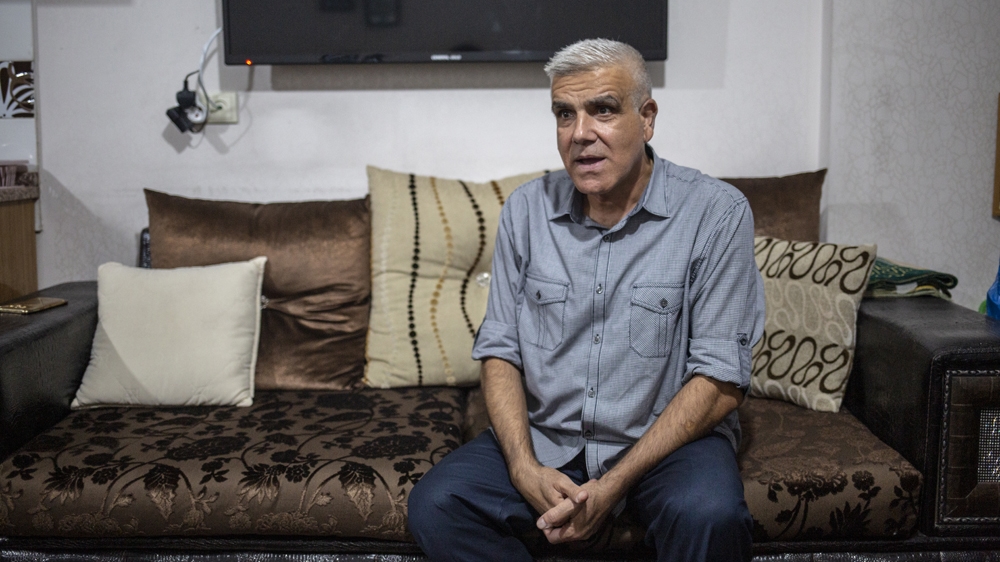‘We’re Arabs just as much as Kurds’: Syrian Kurds call for unity
Fearing sectarianism and the YPG, some Syrian Kurds are choosing to remain in Turkey.

Sanliurfa, Turkey – When her son Anad disappeared at a checkpoint in 2012, Umm Laund feared he was never coming home.
Five days later, Anad walked back into the family home in Hassakeh, Syria; by then she had made up her mind.
Keep reading
list of 4 itemsTurkey hits 71 targets in Iraq, Syria in retaliation for soldiers’ deaths
Turkey says bombers came from Syria, threatens more cross-border strikes
‘Iraqis love life’: In conversation with Ala Talabani
Convinced that her son and his cousin, Chavan, had been arrested by armed opposition fighters because they have Kurdish names, she knew she had to pack up and move the family across the border to Turkey.
“I knew I had to leave for the sake of my four children,” the 57-year-old told Al Jazeera. “If I had stayed, I might have lost him again, but this time for good.”
“Syria has become unnecessarily sectarian … far too quickly,” she added as she put out a second cigarette.
While Umm Laund’s husband stayed behind in their home in Hassakeh, she and their children moved to live with her brother and his family in the Turkish border city of Sanliurfa.
They never returned to their homes – despite the area being under “Kurdish control” – fearing new forms of persecution.
‘We don’t want a divided Syria’
For over a week now, fighters with the opposition Free Syrian Army have been backing Ankara in an operation aimed at driving the Kurdish-led Syrian Democratic Forces (SDF) away from the border area.
The operation was announced as part of Turkey’s plan to carve out a so-called “safe zone” – cleared of the SDF – to which some of the 3.6 million Syrian refugees currently living in Turkey can be returned.
After pushing the SDF out of a large part of two main border towns, Turkish President Recep Tayyip Erdogan said the operation would only be over when “the zone from Manbij to Iraq [is cleared]”.
The SDF, spearheaded by the Kurdish People’s Protection Units (YPG), was founded in 2015 and has helped the United States in its battle against the Islamic State of Iraq and the Levant (ISIL or ISIS) armed group in the region.
It has since significantly expanded its control across northern and eastern Syria and has sought to create an autonomous federation there.
But many Syrians Kurds, including Umm Laund, condemn plans to “cut Syria up”.

“We never returned to our homes because we don’t want a divided Syria, we don’t want a federal system as the YPG does,” she said.
“We want a united Syria that includes all Syrians, regardless of their ethnicity or religion. We don’t differentiate, and consider ourselves Arabs just as much as we are Kurds.”
Ankara views the YPG as an extension of the outlawed Kurdistan Workers’ Party (PKK), and has long made it clear it wants to rid the border area of “terrorist elements”.
The PKK has waged a decades-long armed campaign against Turkey, aiming to form an independent state, and is considered a “terrorist group” by Ankara and many Western countries.
The YPG has been accused of various rights abuses for years, one of the most alarming was recruiting children to become combatants.
In August last year, US-based Human Rights Watch said the YPG was recruiting child soldiers to train in military camps within areas under its control.
“It’s especially horrendous that the group is recruiting children from the vulnerable families in displacement camps without their parents’ knowledge or even telling them where their children are,” HRW acting emergencies director Priyanka Motaparthy, said at the time.
That has been one of the main reasons Umm Laund never thought of returning.
“They [the YPG] took our friends’ and neighbours’ children to fight … They would go door-to-door, speaking to young girls and boys, summoning them … luring them in,” she said.
“Our children are far too dear, we simply couldn’t let that happen.”

Abu Mohammed al-Kurdi, Umm Laund’s brother, agreed.
“We don’t like to be politicised, especially because we don’t endorse or agree with the YPG’s policies,” the 46-year-old said.
The father of six does not have Syrian citizenship.
His family’s ancestors were among thousands of Kurds who were considered “foreigners” for coming into Syria from neighbouring Turkey in the 1900s, following the fall of the Ottoman Empire.
As a result, he was unable to access higher education, find a job in the public sector, or register his marriage with the Syrian government.
“We saw people become doctors, lawyers, professors … but we still loved our country,” Abu Mohammed, who described his family as one with “musical and cultural” interests, said.

Along with his eldest son, who is now 15 years old, Abu Mohammed makes a living by playing at local events on his prized electric organ.
“I condemn all forms of violence … All I ever wanted was to live in peace with my wife and children,” he said.
“Our intent is to bring people together through music and help them see beyond the differences this war imposed on us.”
‘Reclaim Raqqa’
Now home to about 4.5 million people, the northeastern Syrian region is predominantly inhabited by Arabs, with Kurds accounting for more than an estimated 10 percent of its population.
Both ethnicities, along with minority Turkmen and Circassian groups, have coexisted for decades and have married into each other’s tribes and families.
Ibrahim Jaddou, a 50-year-old Kurdish history teacher from Raqqa, married his ethnically Arab wife more than 15 years ago,
Along with their two children, they fled Raqqa in 2012, running from government air attacks on the area.
The teacher-turned-activist still remembers hearing the sounds of bombs fall not too far from his home. He also remembers the gruesome images of the shelling’s aftermath.

“Seeing it is different from hearing about it,” he told Al Jazeera. “I had to do something to help. I cleaned up areas where I had to move body parts with my own hands,” he said.
Before ISIL gained full control of Raqqa, which it proclaimed as the capital of its so-called caliphate in 2014, Jaddou said life had already become “unbearable”.
Asked why he never returned after ISIL was overthrown, Jaddou said he refused to return to another form of oppression.
“The YPG’s policies are strictly sectarian,” he noted, echoing Umm Laund’s sentiment. “They just want to create a country for the Kurds, but what we really want is a system overhaul.”
“I would only support a joint democratic system, one that is inclusive of all our country’s ethnicities and religions,” he continued.
The ongoing operation has given him hope that Raqqa might once again fall into the hands of Turkish-backed opposition, which he supports as an alternative to the government’s rule.
“I would love to see Erdogan help us reclaim Raqqa,” he said.